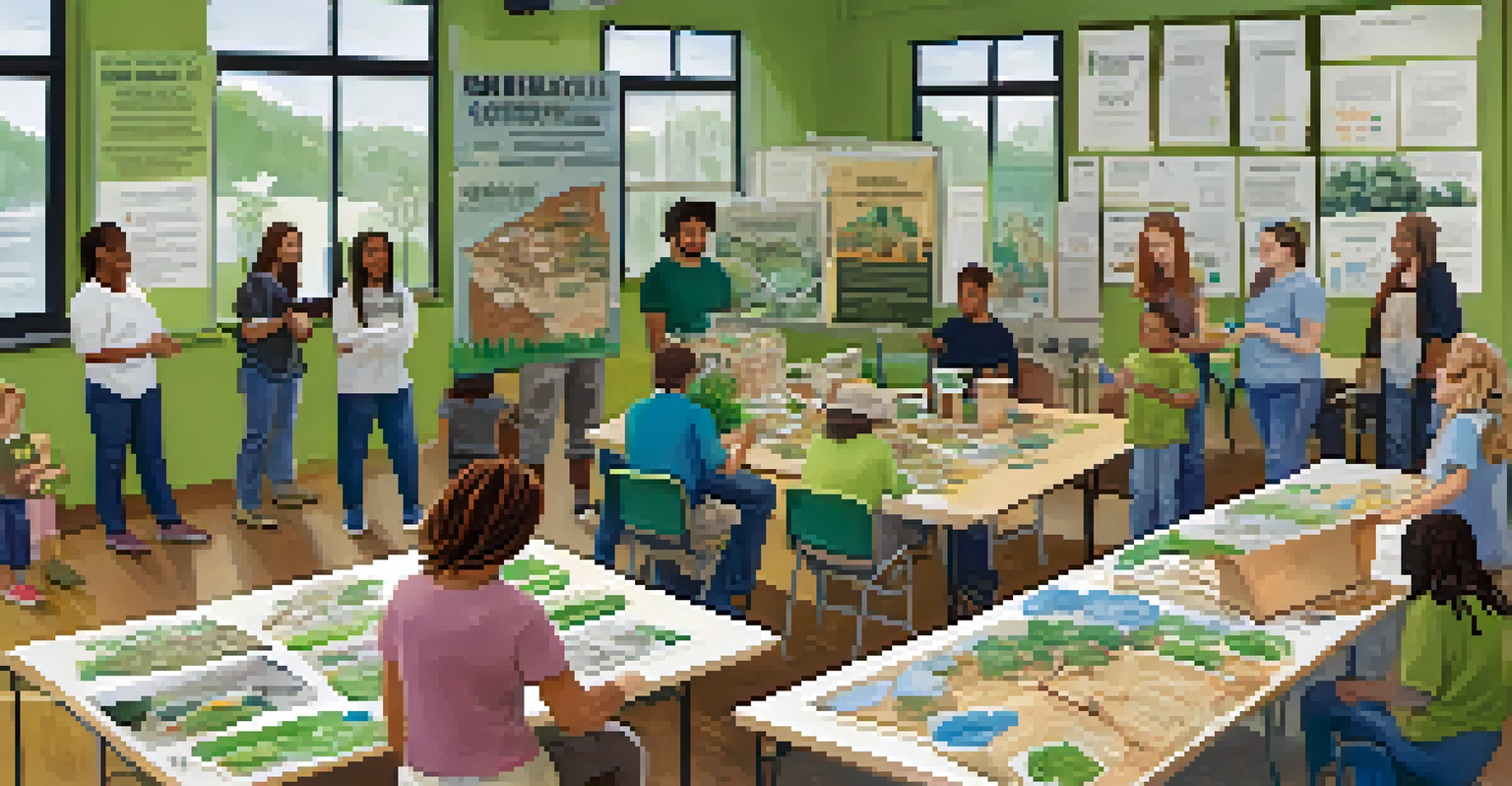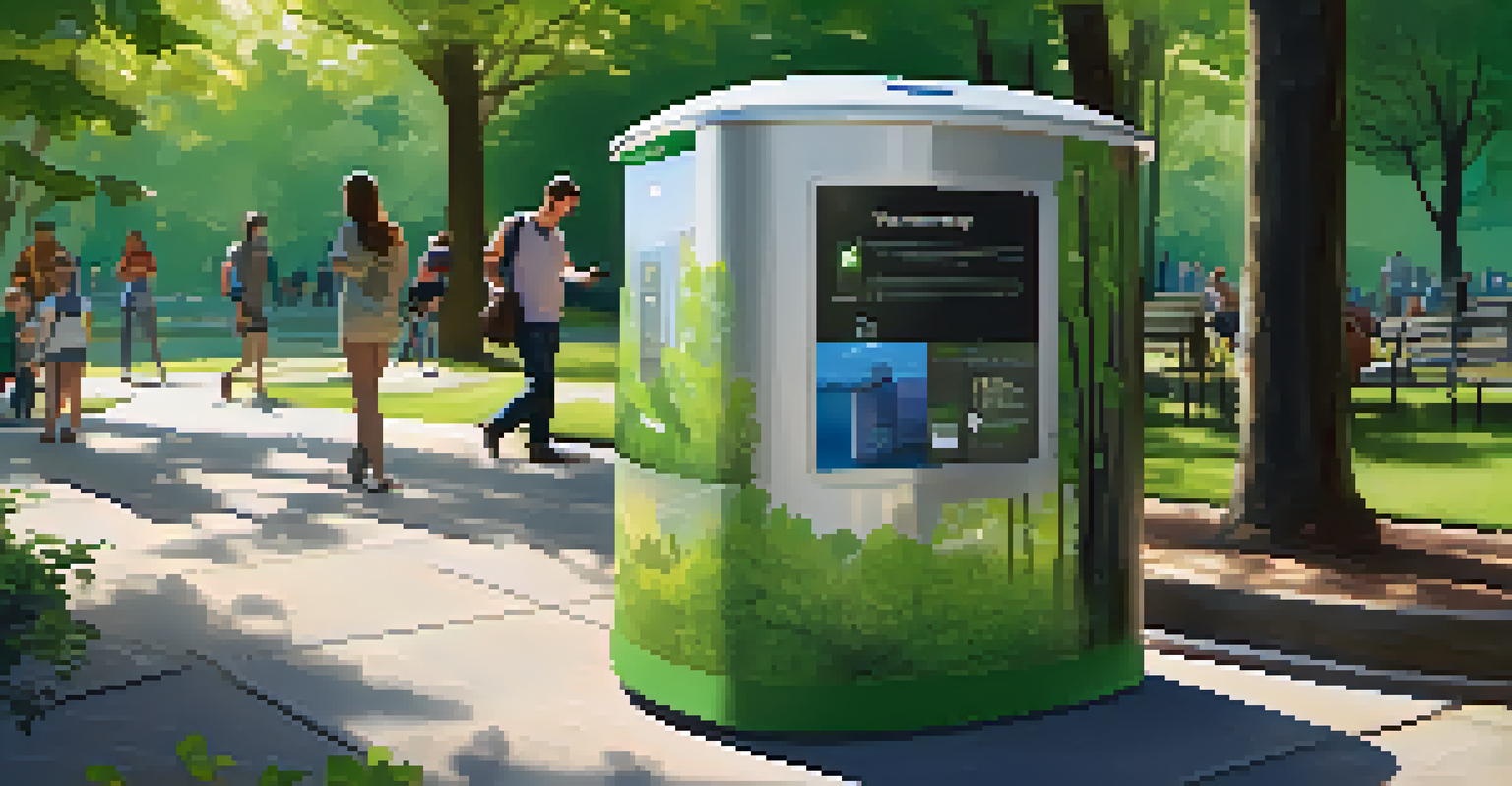Waste Management Strategies: Pittsburgh's Zero Waste Goals

Understanding Zero Waste Principles and Goals
Zero waste is more than just a catchy phrase; it's a philosophy aimed at minimizing waste through careful planning and resource management. The goal is to divert all waste from landfills and incinerators, encouraging recycling and composting instead. Pittsburgh has embraced this approach, aiming for a future where waste is seen as a resource rather than a problem.
Waste is a design flaw.
The concept of zero waste promotes the idea that the design of products and systems should facilitate reuse and recycling. This not only helps the environment but also fosters community awareness and engagement. As Pittsburgh sets its sights on these ambitious goals, the city is focusing on strategies that involve every resident and business.
By adopting zero waste principles, Pittsburgh seeks to reduce pollution and conserve resources, ensuring a healthier environment for future generations. This forward-thinking approach emphasizes the importance of collaboration among citizens, businesses, and local government. Together, they can create a sustainable model that other cities might emulate.
Current Waste Management Practices in Pittsburgh
Pittsburgh's waste management system has evolved over the years, incorporating various practices to handle waste more effectively. Currently, the city employs a combination of recycling, composting, and landfill diversion methods to manage its waste. These practices not only help reduce the amount of waste sent to landfills but also promote a more sustainable community.

Recycling programs in Pittsburgh have seen improvements, with an increased focus on educating residents about proper recycling practices. The city's efforts have led to higher recycling rates, but there's still work to be done. Implementing more accessible recycling options and providing clearer guidelines can significantly impact the overall success of these programs.
Zero Waste Philosophy in Pittsburgh
Pittsburgh is adopting a zero waste philosophy that emphasizes recycling and composting to divert waste from landfills.
In addition to recycling, composting is another vital aspect of Pittsburgh's waste management strategy. By turning organic waste into valuable compost, the city not only reduces landfill waste but also creates a beneficial product for local gardens and parks. This initiative encourages residents to participate actively in waste reduction efforts.
Community Engagement in Zero Waste Initiatives
Community involvement is crucial when it comes to achieving zero waste goals. Pittsburgh has recognized this and has implemented various outreach programs aimed at educating residents about waste reduction. Workshops, seminars, and community events help foster a sense of responsibility and ownership among citizens regarding their waste management practices.
The greatest threat to our planet is the belief that someone else will save it.
One successful initiative is the 'Waste Warrior' program, which trains volunteers to advocate for waste reduction within their neighborhoods. These volunteers work to spread awareness about recycling and composting, making it easier for residents to adopt sustainable practices. By empowering individuals, Pittsburgh builds a strong community foundation for its zero waste journey.
Additionally, collaboration with local businesses is essential. By encouraging businesses to adopt sustainable practices, Pittsburgh can create a ripple effect that influences consumer behavior. When residents see local companies prioritizing waste reduction, they are more likely to follow suit, creating a culture of sustainability throughout the city.
Innovative Waste Reduction Technologies
As Pittsburgh strives for zero waste, embracing innovative technologies is key. New advancements in waste sorting and recycling processes can significantly improve the city's efficiency in managing waste. Implementing smart bins equipped with sensors can help monitor waste levels, ensuring timely pickups and reducing overflow issues.
Moreover, advancements in composting technology allow for faster breakdown of organic waste, turning it into nutrient-rich compost more quickly. These technologies not only streamline processes but also make it easier for residents to participate in composting initiatives. By leveraging technology, Pittsburgh is setting the stage for a more effective waste management system.
Community Engagement is Key
Active community involvement through education and initiatives is crucial for Pittsburgh to achieve its zero waste goals.
The city is also exploring partnerships with tech companies and research institutions to develop new waste reduction solutions. By investing in research and development, Pittsburgh aims to stay at the forefront of sustainable waste management practices. This innovative spirit is essential for achieving its ambitious zero waste goals.
Policy Changes Supporting Zero Waste Efforts
Policy plays a pivotal role in shaping Pittsburgh's waste management strategies. The local government has introduced several policies aimed at reducing waste and promoting recycling. These measures include regulations that require businesses to implement sustainable practices and incentives for residents who actively participate in recycling and composting programs.
One notable policy is the 'Pay-As-You-Throw' program, which charges residents based on the amount of waste they generate. This approach encourages individuals to reduce their waste output, as they can save money by producing less trash. Such initiatives create a direct link between individual behavior and financial incentives, fostering a culture of sustainability.
Furthermore, the city is looking to strengthen its waste management regulations to ensure that all stakeholders contribute to zero waste goals. By holding businesses accountable and providing support for residents, Pittsburgh aims to create a comprehensive framework for sustainable waste management. These policy changes are essential for driving the city's zero waste initiatives forward.
Challenges in Achieving Zero Waste in Pittsburgh
While Pittsburgh's zero waste goals are commendable, the city faces several challenges in realizing these ambitions. One significant obstacle is the public's lack of awareness and understanding of waste reduction practices. Many residents are unsure about what can be recycled or composted, which leads to contamination and inefficiencies in the waste management system.
Additionally, limited infrastructure for recycling and composting can hinder progress. Some neighborhoods may lack access to essential services, making it difficult for residents to participate fully in these initiatives. Addressing these disparities is crucial for ensuring that all communities can contribute to the city's zero waste efforts.
Innovative Technologies for Waste
Pittsburgh is leveraging innovative technologies and policy changes to improve its waste management systems and promote sustainability.
Finally, financial constraints can also pose challenges. Implementing new technologies and expanding existing programs require funding and resources. To overcome this, Pittsburgh must explore partnerships, grants, and community support to secure the necessary investments for a successful transition to zero waste.
The Future of Waste Management in Pittsburgh
Looking ahead, Pittsburgh's commitment to zero waste presents exciting opportunities for the city and its residents. By continuing to innovate and engage the community, Pittsburgh can set a benchmark for waste management that other cities aspire to achieve. The ongoing development of new technologies and policies will play a crucial role in shaping the future of waste management.
As more residents become aware of their impact on the environment, there will be a growing demand for sustainable practices. This shift in mindset can lead to increased participation in recycling and composting programs, ultimately reducing the city's overall waste footprint. The future looks bright for Pittsburgh as it cultivates a culture of sustainability.

Ultimately, the goal is not just to achieve zero waste but to inspire other cities to follow suit. Pittsburgh's journey serves as a testament to what can be accomplished through collaboration, innovation, and community engagement. By sharing its successes and challenges, Pittsburgh can lead the way toward a more sustainable future for all.